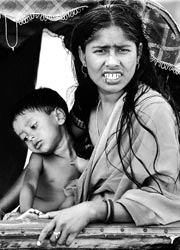
Many women leaders, not much equalityUNITED NATIONS, (IPS) - Asia, a sprawling continent which has produced the world's largest number of female heads of government, lags far behind both in gender equality and gender empowerment. "Progress has been made in reducing gender discrimination in Asia and the Pacific, though the pace has been uneven between sub-regions and individual countries," says the 2007 annual regional survey carried out by the Bangkok-based Economic and Social Commission for Asia and the Pacific (ESCAP).
Female primary school enrolment is about 26 percent lower than that of males, while violence against women continues unabated in the region, the new survey said."In some countries, one in every 10 girls dies before reaching the age of one, and one in every 50 women dies during pregnancy and delivery." Still, the Asia-Pacific region, which produced women leaders in seven countries (India, Sri Lanka, Pakistan, Bangladesh, Indonesia, the Philippines and New Zealand), has made tangible progress in several other areas. Since 1997, the number of women parliamentarians in the region has increased by 50 percent, while women's life expectancy has increased from 44 years during 1950-1955 to 70 years in 2000-2005, with a slightly higher growth rate for women than men. The largest representation of women in parliaments was in New Zealand, followed closely by Vietnam, Turkmenistan and Timor-Leste. The lowest representation was in Papua New Guinea, Bangladesh (which produced two women prime ministers) and Vanuatu. But Robert Vos, director of the UN's development policy and analysis division, told reporters this week the region is losing about 42 billion to 50 billion dollars annually because of restrictions on women's access to employment opportunities. At the same time, he said, the Asia-Pacific region is also losing an additional 16 to 30 billion dollars a year because of gender gaps in education. "If female workforce participation was placed on a par with developed countries, such as the United States, India's gross domestic product (GDP) would increase by about 1.08 percentage points -- a gain of about 19 billion dollars." "These numbers are quite substantial, so there is a big case to be made to try and bridge these gaps in gender equality," Vos said. Jessica Neuwirth, of the women's activist group Equality Now, told IPS the new ESCAP study recognises and documents the extent to which discrimination against women costs society as a whole. "What we need, though, is more action to remedy the discrimination that has been so extensively documented." She said many countries in the region, and around the world, still have laws in force that explicitly discriminate against women. This represents state-sanctioned, second class citizenship. "Governments need to do much more to comply with the obligations they have undertaken repeatedly in UN treaties and international fora such as the 1995 UN Fourth World Conference on Women, which adopted the Beijing Platform for Action," she noted. The United Nations should do more to highlight and address the implementation gap that persists and work to create more effective mechanisms to hold states accountable for the commitments that have been made to end all forms of discrimination against women, Neuwirth added. The ESCAP study says the Philippines and New Zealand are the only countries in the Asia-Pacific region in the top 10 of a global index of gender equality. The Philippines is described as the regional leader, with good performance in all the areas of the index: economic participation and opportunity, educational attainment, health and survival, and political empowerment. "One of the fundamental reasons women are subject to discrimination is that they do not have a voice in decision-making at home or in society, even when the matters are directly related to them," says the study. They are powerless intellectually, materially and politically. As a result, even if women are allowed to take independent action, their efforts are not productive because they are denied access to resources, according to the study. The report argues that gender balance can be achieved at minimum of effort and cost provided there is political commitment at the highest levels. Among the recommendations in the study are:
|
| || Front
Page | News
| Editorial
| Columns
| Sports
| Plus
| Financial
Times | International
| Mirror
| TV
Times | Funday
Times || |
| |
Copyright
2007 Wijeya
Newspapers Ltd.Colombo. Sri Lanka. |
